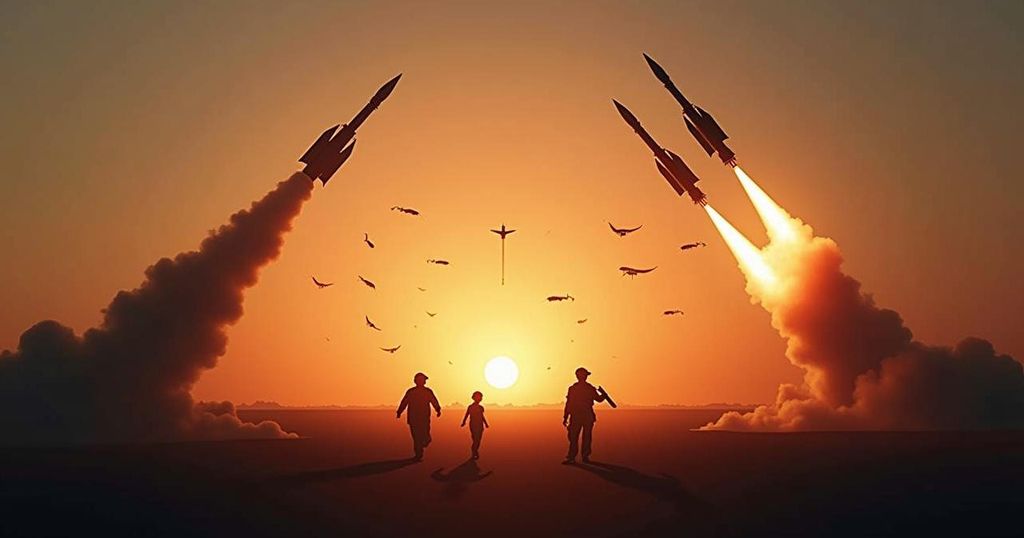Iran Launches Missile Attack on Israel in Response to Militant Killings

Iran’s IRGC has launched a missile attack at Israel, reportedly in retaliation for the killings of key militant leaders. The attack did not target U.S. troops, and Israel has urged citizens to seek shelter. The geopolitical implications are significant, with U.S. support for Israel expressed by President Biden. Tensions continue to escalate in the region as air travel restrictions are imposed.
The Islamic Revolutionary Guard Corps (IRGC) of Iran has reportedly launched a significant missile attack targeting Israel. According to The Washington Post, three anonymous officials from the Pentagon indicated that American military personnel stationed in the Middle East were not the targets of this strike. There have been prior incidents of rocket attacks by Iraqi factions linked to Iran on bases housing US troops in Iraq and Syria. Al Jazeera has been reporting from Jordan due to restrictions imposed by the Israeli government. The missiles were said to have traversed the skies over Amman, resulting in observable explosions in the area. The Israeli military confirmed the missile launches from Iran and has urged the public to remain vigilant and seek shelter in place. At least three separate missile attacks were noted, affecting regions including Tel Aviv and occupied East Jerusalem, with sirens also activated in Jordan. Israeli officials had prior knowledge of the potential for an attack but were caught off guard by its rapid execution. Consequently, Israel’s security cabinet is convening in a secure location in West Jerusalem. The IRGC has articulated that this missile offensive is a retaliation for the recent killings of Hezbollah leader Hassan Nasrallah and Hamas leader Ismail Haniyeh. The IRGC stated, “In response to the martyrdom of Ismail Haniyeh, Hassan Nasrallah and [IRGC commander Abbas] Nilforoushan, we targeted the heart of the occupied territories.” Iran claims that the missile assault has concluded and has cautioned the Israeli government against retaliatory measures. The Iranian ambassador to the United Nations has described the attack as a legitimate response to actions perceived as violations of Iranian sovereignty, asserting, “Iran’s legal, rational, and legitimate response to the terrorist acts of the Zionist regime… has been duly carried out.” Furthermore, Jordan’s state news agency reported a temporary suspension of air traffic, while at the same time, Israeli Army Radio confirmed that operations at Ben Gurion International Airport were halted. The Israeli military has advised citizens to remain in protected areas and issued statements regarding the explosions being attributed to missile interceptions and impacts. The far-right Israeli finance minister has voiced on social media, “Like Gaza, Hezbollah and the state of Lebanon, Iran will regret the moment.” Tel Aviv resident Akiva Eldar described the alarming atmosphere, stating, “We’re not far from the Ministry of Defence and the Israeli military HQ… and we’re still hearing sirens in Tel Aviv. We’re not really safe as long as war is still on. There have been clear instructions to stay in the safe rooms and bomb shelters.” On the international stage, U.S. President Joe Biden conveyed that the United States stands ready to assist Israel in defending against the Iranian missile assaults and in safeguarding American forces stationed in the region, stating, “We discussed how the United States is prepared to help Israel defend against these attacks, and protect American personnel in the region.”
The tensions between Iran and Israel have escalated significantly, particularly following the assassination of key figures such as Hezbollah’s Hassan Nasrallah and Hamas’s Ismail Haniyeh. Iran’s military structure, particularly the IRGC, plays a pivotal role in shaping the country’s foreign military engagements, often responding vigorously to perceived threats or actions taken against its leadership and interests. The geopolitical landscape in the region is further complicated by the presence of U.S. forces, which have often found themselves in the crossfire of Iran’s proxy warfare in Iraq and Syria. This latest missile attack represents a culmination of these tensions, underscoring the fragile security environment that persists between Israel and Iran. Additionally, the reaction of the international community, particularly the United States, reflects ongoing alliances and strategic considerations within the region.
The missile launch by Iran’s Islamic Revolutionary Guard Corps against Israel signals a significant escalation in ongoing regional tensions, framed as retaliation for the killings of prominent militant leaders. The complex interplay of military actions, geopolitical alliances, and the response from both local and international actors highlights the precarious security dynamics in the Middle East. While Iran asserts its actions are justified responses to provocations, Israel maintains its stance of vigilance and readiness against further aggression. The involvement of the United States signifies the broader implications of this conflict for regional stability.
Original Source: www.aljazeera.com








